

LiquidFeedback - more than Liquid Democracy. OpenDCN - Fre e-Democracy. Free-Project.org / GNU.FREE. FREE e-democracy project. E-Democracy.org. Moderator. Parlement et Citoyens. La plateforme de Parlement & Citoyens, c'est l'outil web qui va permettre aux parlementaires et aux citoyens de co-construire pas à pas des propositions de lois solides, réfléchies, partagées et soutenues par le plus grand nombre.
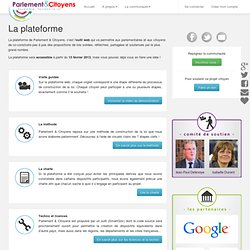
La plateforme sera accessible à partir du 13 février 2013, mais vous pouvez déjà vous en faire une idée ! Visite guidée Sur la plateforme web, chaque onglet correspond à une étape différente du processus de construction de la loi. Chaque citoyen peut participer à une ou plusieurs étapes, exactement comme il le souhaite ! La méthode Parlement & Citoyens repose sur une méthode de construction de la loi que nous avons élaborée patiemment.
La charte Si la plateforme a été conçue pour éviter les principales dérives que nous avons constatées dans certains dispositifs participatifs, nous avons également prévue une charte afin que chacun sache à quoi il s’engage en participant au projet. Techno et licences Améliorer la plateforme. Best Government Software. Grupo Soltel. eDemocracy - Scytl. E Democracy Suite. Features:
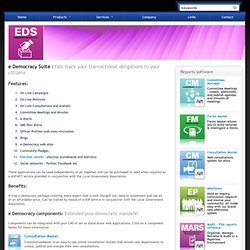
Committee Management and e-Democracy Software - CMIS from Astech. LiquidFeedback - more than Liquid Democracy. Internet Access, Internet Community for Peace and Democracy Movement and Activists. New Tools of democracy - BeyondVoting. All of these articles have saved me a lot of hedaaches.
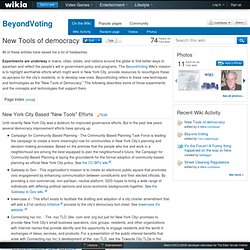
Experiments are underway in towns, cities, states, and nations around the globe to find better ways to ascertain and reflect the people's will in government policy and programs. The BeyondVoting Wiki's mission is to highlight worthwhile efforts which might work in New York City, provide resources to reconfigure these as apropos for the city's residents, or to develop new ones. Goodspeed Update » Internet Tools for e-Democracy in Urban Planning. Update, October 2009 – I have launched a directory of web tools for collaboration in planning on my MIT website and will no longer be updating this page.
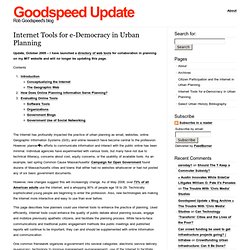
Contents The Internet has profoundly impacted the practice of urban planning as email, websites, online Geographic Information Systems (GIS), and online research have become central to the profession. ITA: E-democracy. The many ways in which we communicate today allow us not only to provide information but also to create new communication channels and even participate in political decisions.
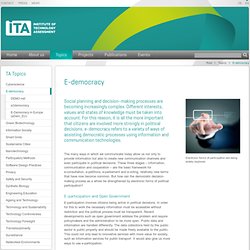
Www.solveit.ch. E-Democracy vs. Open Democracy. The cathedral and the bazaar…1 redux (Part I) By Laurence Allard and Olivier Blondeau2 In a contribution to a collection of essays put together by Pascal Perrineau, Le Désenchantement démocratique, Thierry Vedel sketched the broad outlines of e-democracy, its origins, the different visions it carries with it and the issues it raises.3 His analysis is based around three points aimed at correcting the main flaws of representative democracy: citizen information, meant to make up for the lack of transparency in the political process, which the author sees as a reference to the enlightened citizen dear to the hearts of liberal philosophers such as Thomas Jefferson;debate and discussion compensating for the narrowness – or closure – of the public sphere.
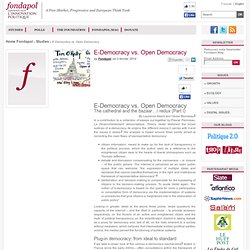
E-democracy à la russe: Russians now have their own ‘We the People’ platform. In a bid to promote legislative ideas and suggestions from Russian citizens, the Information Democracy Foundation (IDF), a government sponsored non-profit, last week launched the beta version of the Russian Public Initiative (RPI), a web platform inspired by the US “We the People” online petition system.
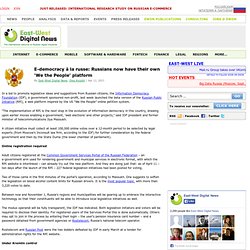
“The implementation of RPI is the next step in the evolution of information democracy in this country, drawing upon earlier moves enabling e-government, ‘web elections’ and other projects,” said IDF president and former minister of telecommunications Ilya Massukh. A citizen initiative must collect at least 100,000 online votes over a 12-month period to be selected by legal experts (from Moscow’s Inconsult law firm, according to the IDF) for further consideration by the federal government and then by the State Duma (the lower chamber of parliament). Online registration required Two of those came in the first minutes of the portal’s operation, according to Massukh. Under Kremlin control. Democracy and Technology. About ICT Programming & Democracy Information and communication technologies present benefits and challenges to democratic development.
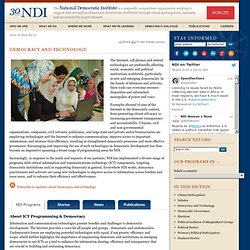
The Internet provides a voice for all people and groups - democratic and undemocratic. Undemocratic forces are employing powerful technologies with equal, if not greater, efficiency and scope, which further highlights the importance of empowering democrats and institutions in emerging democracies to use ICTs as a tool to enhance the information sharing, efficiency and transparency that are crucial to building and sustaining democracy. Providing access to all citizens, particularly those in less developed socioeconomic areas in developing and developed nations, presents a related developmental challenge. Your Priorities. eDemocracy Boostrap.
Feedback & Online Help Desk Software. Clarity eDemocracy Portal - SOE a Scytl company. THE PROBLEM OF TECHNOLOGIES AND ATTITUDES TOWARDS E-DEMOCRACY IN EASTERN AND WESTERN EUROPE - тема научной статьи по социологии, читайте бесплатно текст научно-исследовательской работы в электронной библиотеке КиберЛенинка.
Where’s the free e-democracy project? The free e-democracy project’s website (free-project.org) has been abosrbed into my personal website, no content has been lost.
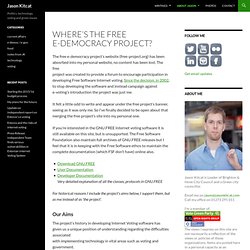
The free project was created to provide a forum to encourage participation in developing Free Software Internet voting. Since the decision, in 2002, to stop developing the software and instead campaign against e-voting’s introduction the project was just me. It felt a little odd to write and appear under the free project’s banner, seeing as it was only me. So I’ve finally decided to be open about that merging the free project’s site into my personal one. If you’re interested in the GNU.FREE Internet voting software it is still available on this site, but is unsupported. For historical reasons I include the project’s aims below, I support them, but as me instead of as ‘the project’. Our Aims. GroupServer Open Source Platform: E-Democracy.org. E-Democracy uses open source software to the greatest extent possible.
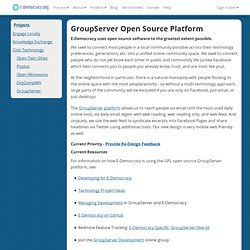
We seek to connect most people in a local community possible across their technology preferences, generations, etc. into a unified online community space. We seek to connect people who do not yet know each other in public and community life (unlike Facebook which best connects you to people you already know, trust, and are most like you). At the neighborhood in particular, there is a natural monopoly with people flocking to the online space with the most people/activity - so without a multi-technology approach, large parts of the community will be excluded if you are only on Facebook, just email, or just desktops. The GroupServer platform allows us to reach people via email (still the most used daily online tool), via daily email digest with web reading, web reading only, and web feed.
And uniquely, we use the web feed to syndicate excerpts into Facebook Pages and share headlines via Twitter using additional tools. Votre voix, vos choix. Boite démocratique. eJournal of eDemocracy and Open Government. E-Democracy.org. AV Reloaded - Virtual Assemblée 15M (VirtualPol) MakeYourLaws/MakeYourLaws. Citizen Place. E-democracy. E-democracy (a combination of the words electronic and democracy) incorporates 21st-century information and communications technology to promote democracy. That means a form of government in which all adult citizens are presumed to be eligible to participate equally in the proposal, development, and creation of laws.[1] E-democracy encompasses social, economic and cultural conditions that enable the free and equal practice of political self-determination.
History[edit] During the 20th century democratic participation was frequently restricted to a wealthy clique that was periodically selected via the election of delegates from political parties which had developed a manifesto. Virtual social networks matured at the beginning of the 21st century, enabling the emergence of flashmobs. Following the financial crisis of 2007–08 a number of social networks proposed demonstrations such as the Occupy movement or the 15-M Movement, which started in Spain and spread to other European countries. Cyberdémocratie. Un article de Wikipédia, l'encyclopédie libre. La cyberdémocratie (ou e-démocratie) consiste en l'utilisation d'Internet pour développer la démocratie, en se servant de sites web comme support des informations, des débats voire des processus de décisions démocratiques.
La cyberdémocratie cherche à répondre à l'idéal démocratique dans lequel tous les citoyens seraient des participants égaux aux propositions, aux créations et à la mise en œuvre des lois. Origine du nom[modifier | modifier le code] La cyberdémocratie est une traduction littérale du terme américain Cyberdemocracy. Cependant, en anglais, un autre terme fréquemment utilisé est celui de E-democracy. En 1981, Ted Becker, homme politique américain, a créé le terme de Teledemocracy pour désigner l'utilisation des moyens modernes de communication dans le processus démocratique.
On trouve aussi le terme de démocratie virtuelle. White House 2. List of direct democracy parties. Rbjarnason/open-active-voting. Your Priorities. Open Government Initiative. Open Data Policy Guidance to better manage Federal information as an asset to make it more open, accessible, and usable by the public. 8 Principles of Open Government Data. [To The Wiki >>] Request for Comments December 7-8, 2007—This weekend, 30 open government advocates gathered to develop a set of principles of open government data.
The meeting, held in Sebastopol, California, was designed to develop a more robust understanding of why open government data is essential to democracy. The Internet is the public space of the modern world, and through it governments now have the opportunity to better understand the needs of their citizens and citizens may participate more fully in their government. Information becomes more valuable as it is shared, less valuable as it is hoarded. The group is offering a set of fundamental principles for open government data.